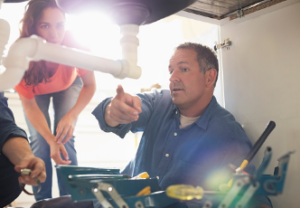Plumbers and Plumbing Fixtures and Fittings
Plumbers are responsible for installing, maintaining and repairing water pipes and fixtures in residential and commercial buildings, sewage lines, and sometimes industrial pipes.
They must protect people and property by ensuring plumbers Gawler systems adhere to regulations, codes, and standards. Furthermore, they need the ability to resolve issues swiftly and efficiently.
Installation
 Plumbers are the trade professionals responsible for installing and repairing pipes transporting water, gas and waste. Additionally, they may install plumbing fixtures like bathtubs and toilets and appliances like washing machines and dishwashers.
Plumbers are the trade professionals responsible for installing and repairing pipes transporting water, gas and waste. Additionally, they may install plumbing fixtures like bathtubs and toilets and appliances like washing machines and dishwashers.
Plumbers work in various settings, from large industrial plants to residential homes. Their duties and responsibilities differ, but the basic tasks include repairing, maintaining and troubleshooting plumbing systems in residential and commercial buildings.
Construction professionals collaborate with architects during new builds and renovations to guarantee that everything runs smoothly, protecting the integrity of the building. In addition, they save time and money by helping architects determine optimal locations for wall passages and fixtures.
Installing plumbing fixtures and fittings is a crucial stage of home construction, usually occurring alongside wiring and duct installation. It requires extensive coordination to ensure everything runs smoothly.
Selecting the ideal materials for your plumbing fixture can be critical to its long-term reliability. Neglecting to do so may result in broken or cracked pipes, compromising your system’s workings.
A reliable plumbers Gawler should be able to size your existing plumbing system and suggest suitable fixtures accurately. It is especially pertinent if installing new fixtures in a bathroom or kitchen since these rooms typically have specific dimensions.
Repair
Repairing plumbing fixtures and fittings requires specialised knowledge and skills. A plumber installs, repairs and maintains water, sewer and gas pipes and fixtures in residential or commercial buildings and maintains and troubleshoots piping systems to keep them functioning optimally.
Plumbers are commonly found in residential homes but can be hired for commercial construction projects. By working with other construction professionals, plumbers ensure all project elements – including plumbing – are completed correctly.
Plumbers sometimes specialise in specific installations, such as gas or HVAC systems. It is often the case in commercial buildings and can increase your pay by offering you the chance to learn new things.
Maintenance
Plumbing fixtures and fittings are the components that allow water into your home or business. These include valves, faucets, toilets, shower heads, drain stoppers and basins – all designed to last long and are replaceable as necessary. Plus, they come in various colours, materials and styles, so you can find one to suit your tastes, needs and budget.
Maintenance plumbers inspect plumbing components for leaks, cracks and corrosion. They also check drainage issues and clogs with tools like motorised drain augers to clear sewer drain lines.
To guarantee your plumbing system remains optimal, scheduling annual maintenance is wise. Professionals performing the inspection will detect minor issues which could become more significant issues later. In addition, doing this saves money in the long run since there will be fewer repair bills than waiting until an urgent problem occurs.
Maintaining your plumbing system can also prevent water damage in your home. Leaking pipes can cause severe harm and raise your water bill significantly.
Design
Plumbing fixtures and fittings are essential to transport the piping system’s liquids, gases or waste. They make connecting different sections of pipes or tubes possible, regulating fluid flow and allowing users to alter its direction.
Designing plumbing systems necessitates knowledge of physics, engineering and other technology subjects. It also necessitates problem-solving solid abilities and the capacity to analyse complex issues. In addition, plumbers may need to collaborate with other design specialists on a project to guarantee their work is efficient and meets all relevant standards.
Plumbers are responsible for installing and repairing plumbing in residential and commercial buildings. Their work involves assessing the system, designing it, and ensuring it complies with all local building codes.
Plumbers may work independently or as part of a team, travelling to remote locations to complete repair jobs. Furthermore, they research and study the latest technologies and trends within the industry.
They utilise various tools and equipment to do their job, such as electric drills, saws, hammers, wrenches, screwdrivers, pipe cutters, hydraulic jacks, pneumatic hoses, valves and drain snakes. Furthermore, they wear safety goggles and respirators while being trained on all regulations within their area.
